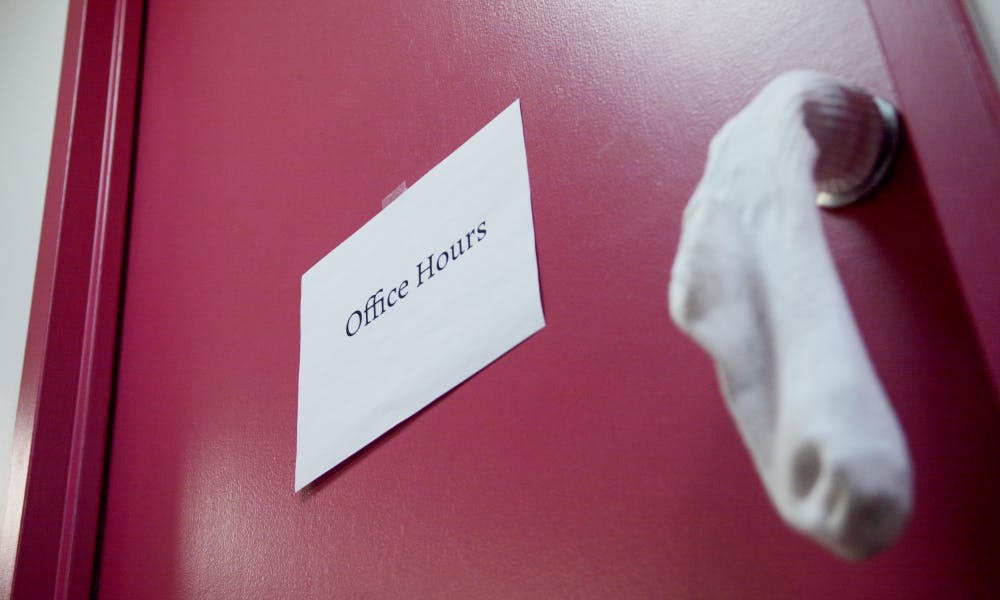I’ve never had sexual feelings for a Penn faculty member, nor do I plan on having a romantic relationship with one. So, I wasn’t too upset when, last week, the University banned sexual relations between faculty and undergraduates.
But, after thinking about it further, one question stuck in my mind: Is it really the administration’s business to invade our bedrooms?
Prior to the implementation of this new policy, sexual relations between faculty and undergraduates were only banned between students and professors who taught their class. This is only fair, as an instructor can’t be impartial when grading a student they have a private relationship with. Furthermore, I believe that students who have engaged in sexual relations with certain professors should not be permitted to take classes with them.
Still, all undergraduates are older than 16, the legal age of consent in Pennsylvania, and most are 18 years old. We can buy cigarettes, enlist in the army, and possess firearms. So if we want to sleep with a professor, Penn shouldn’t stop us.
While many universities, including Harvard University, have also banned faculty-student relationships, a few schools continue to enforce less stringent policies consistent with Penn’s previous policy. Columbia University only mandates that “no faculty member shall have a consensual romantic or sexual relationship with a student over whom he or she exercises academic or professional authority.”
In an email to The Daily Pennsylvanian, Provost Wendell Pritchett elaborated on the reasoning behind the University’s decision:
"It is one of our highest priorities at Penn to sustain a campus free of sexual violence, sexual harassment, and all other forms of sexual misconduct," Pritchett wrote. "In this light, we have updated the University’s policy on Consensual Sexual Relations Between Faculty and Students, which was originally published in 1995."
While it is of the utmost importance that Penn address sexual assault on campus, I’m skeptical that this policy will be very effective in doing so.
According to the 2015 Association of American Universities Campus Climate Survey, 23 percent of female graduate respondents identified a faculty member as the perpetrator of harassment, whereas only 5 percent of female undergraduate respondents did.
As Provost Pritchett articulated, the objective of forbidding sexual relations between students and faculty is to prevent sexual assault. But given the large percentage of female graduate students who stated that a faculty member had harassed them, why didn’t Penn extend the policy beyond undergraduates? Given the data, this seems out of line with the administration’s goals.
Usually, those who oppose sexual relations between faculty and students will argue that the inherent power dynamic will result in a harmful relationship. This certainly has some truth to it. Still, Penn can provide the proper education regarding the dangers that come with these relationships, instead of prohibiting them altogether. Ultimately, we are adults, capable of making our own decisions without interference from the administration.
What’s more, workplace relationships are far from out of the ordinary. Many well-respected companies permit sexual activity between employees so long as it is reported to human resources. The implementation of a system of reporting relationships between faculty and students at Penn might help prepare students for these dynamics in the future.
Don’t get me wrong, faculty-student relationships are nuanced, and demand careful consideration. Personally, I wouldn’t want to get involved with a professor. But this doesn’t change the fact that the logic behind Penn’s new policy is highly flawed. It ignores the more thoughtful rules of peer institutions, as well as those of well-respected companies. Furthermore, sexual assault on Penn’s campus is a wider problem than faculty-student relationships. At the biaunnual University Council Open Forum, two students strongly criticized Penn’s current system for students to report sexual assault. Engineering senior Carolyn Kearney called for the University to do more to make sure that students who have been victims of sexual assault do not have to interact with their assailants while on campus.
So let’s demand more effective policy change from the administration — Penn can combat sexual assault without treating its students like minors.

ISABELLA SIMONETTI is a College freshman from New York studying English. Her email address is simonetti@thedp.com.



